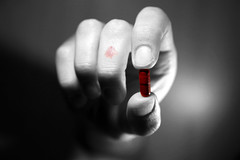Cognitive liberty is the concept that an individual has absolute sovereignty over their state of consciousness as long as it does not infringe on the rights of another. This includes the use of meditation, prayer, and psychoactive drugs, as well as the right to not be force-fed any psychoactive drug against one’s will.
Currently, cognitive liberty is not a very much respected philosophy in American politics. Most psychoactive drugs like cannabis, psilocybin mushrooms, LSD, and mescaline are considered illegal to possess and consume. Similarly, we see young children all throughout the nation being force-fed certain psychoactive drugs (the “good kinds”) in name of “normal thinking” and “normal behavior.”
As a libertarian, I feel cognitive liberty is a necessary component to any free society. I have written numerous times about my disdain for the War On Drugs and specifically the failure that is marijuana prohibition.
I am also against our tendency as a society to administer psychoactive drugs so carelessly and with so little respect for the free choice of young people and the mentally ill. It is an awful thing to offer a drug to any person without appropriately informing them on what the drug is supposed to do or how it might make them feel. We should also explain to children very clearly that they have a choice whether or not to continue taking the drug if they don’t like its effects. It often happens where a child’s personal interest is put secondary or even overlooked completely.
Let it be known that I do think there are cases where someone needs to be given a drug against their will (maybe if they are unconscious or completely delusional and incoherent). But these situations are limited, and I think it is safe to say that society and government has overstepped its boundaries on more than a couple fronts when it comes to this issue.
Who really has the authority to tell a conscious and thinking being what they can and cannot put into their body or how they should experience reality? I don’t consider it justified for any free society to draw such arbitrary distinctions between what is “good” or “bad” for an individual if that individual is exercising their own rational free choice. People have different values and interests in life – this is the same dimension of diversity that characterizes all of nature and what has made evolution possible.
The act of consuming drugs is a victimless crime, and it does not justify people getting locked up in prison or having a criminal record that inhibits them from ever getting a good job or building a bright future. Drugs have been present in every society known to man and it is time we respect their place in the structure of our humanity. It is one thing to advise others against the use of certain drugs, and it is another to try to banish their existence or ignore it entirely.
I am perfectly comfortable acknowledging the fact that some drugs have negative consequences while still promoting the freedom for others to use these same drugs. For one thing, negative consequences are a part of all decisions we make – it does not mean we sacrifice our freedom to make those decisions. To borrow from something I wrote in a recent article about government spending,
“Just because half of American marriages end in a divorce doesn’t mean we want the government to make decisions on who we should marry. Life is filled with mistakes; it is how we learn, and it is a part of freedom.”
If you really want to help those who are dependent on drugs – or if you really want to make a long lasting change in any individual’s behavior – then you need to appeal to that person’s reason. You can not rule a rationally thinking person by force. And yes, even a drug addict has his or her own mode of rational thought in accordance with their own values and interests.
When people value something strong enough, they find a way to go against government restrictions in order to satisfy that want. This is why prohibition always leads to a black market for goods that society finds valuable.
When will people recognize that others value these drugs? When will we learn to tolerate these differences? If we really want to make a positive change than we need to re-think freedom and re-think the way we influence others if we want to continue living in a free society. If we don’t accept the notion of cognitive liberty, if we sacrifice those fundamental principles of self-ownership and freedom of thought, then in what ways are we really free anymore?
To learn more please visit The Center For Cognitive Liberty & Ethics, which includes notable members like visionary artist Alex Grey, libertarian psychiatrist Thomas Szasz, and psychedelic researcher Ralph Metzner (who used to work with Timothy Leary).
Ludwig Von Mises



